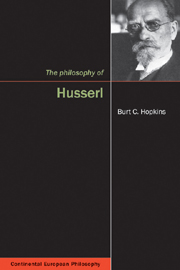Book contents
- Frontmatter
- Contents
- Acknowledgements
- Abbreviations
- Prolegomenon: Husserl's turn to history and pure phenomenology
- I Plato's and Aristotle's theory of eidē
- II From descriptive psychology to transcendentally pure phenomenology
- III From the phenomenology of transcendental consciousness to that of monadological intersubjectivity
- IV From monadological intersubjectivity to the historical a priori constitutive of all meaning
- 11 The pure phenomenological motivation of Husserl's turn to history
- 12 The essential connection between intentional history and actual history
- 13 The historicity of both the intelligibility of ideal meanings and the possibility of actual history
- 14 Desedimentation and the link between intentional history and the constitution of a historical tradition
- 15 Transcendental phenomenology as the only true explanation of objectivity and all meaningful problems in previous philosophy
- V The unwarranted historical presuppositions guiding the fundamental ontological and deconstructive criticisms of transcendental philosophy
- Epilogue: Transcendental-phenomenological criticism of the criticism of phenomenological cognition
- Coda: Phenomenological self-responsibility and the singularity of transcendental philosophy
- Notes
- Bibliography
- Index
11 - The pure phenomenological motivation of Husserl's turn to history
from IV - From monadological intersubjectivity to the historical a priori constitutive of all meaning
- Frontmatter
- Contents
- Acknowledgements
- Abbreviations
- Prolegomenon: Husserl's turn to history and pure phenomenology
- I Plato's and Aristotle's theory of eidē
- II From descriptive psychology to transcendentally pure phenomenology
- III From the phenomenology of transcendental consciousness to that of monadological intersubjectivity
- IV From monadological intersubjectivity to the historical a priori constitutive of all meaning
- 11 The pure phenomenological motivation of Husserl's turn to history
- 12 The essential connection between intentional history and actual history
- 13 The historicity of both the intelligibility of ideal meanings and the possibility of actual history
- 14 Desedimentation and the link between intentional history and the constitution of a historical tradition
- 15 Transcendental phenomenology as the only true explanation of objectivity and all meaningful problems in previous philosophy
- V The unwarranted historical presuppositions guiding the fundamental ontological and deconstructive criticisms of transcendental philosophy
- Epilogue: Transcendental-phenomenological criticism of the criticism of phenomenological cognition
- Coda: Phenomenological self-responsibility and the singularity of transcendental philosophy
- Notes
- Bibliography
- Index
Summary
The problem of history in Husserl's last writings
The fourth and final stage of Husserl's development is contained in two fragmentary texts on history and phenomenology written in his last years, texts that unmistakably link the meaning of both the crowning achievement of the Enlightenment (the new science of mathematical physics) and the crowning achievement of his own life's work (the rigorous science of transcendental phenomenology) to the problem of their historical origination. It is striking that in the years following the original publication of these works and their republication in the 1954 Crisis volume edited by Walter Biemel, commentary on them has almost universally passed over what Husserl articulated as the specifically phenomenological nature of the problem of history. It has been ignored in favour of mostly critical discussions of Husserl's putative attempt to accommodate his earlier “pure” and therefore “idealistic” formulations of transcendental phenomenology to the so-called “problem of history”.
The reception of Husserl's last works has therefore been preoccupied with the story of their departure from his own early rejection of historicism and his late attempts to establish what by many has been deemed oxymoronic and therefore impossible: a phenomenology of the a priori structure of the historical origination of meaning. As mentioned at the beginning of this work, motivated by the goal of establishing phenomenology as a presuppositionless universal science of a priori meanings, Husserl's early thought had identified the “facticity” of history as among those presuppositions standing in the way of a “pure” phenomenology.
- Type
- Chapter
- Information
- The Philosophy of Husserl , pp. 174 - 180Publisher: Acumen PublishingPrint publication year: 2010

